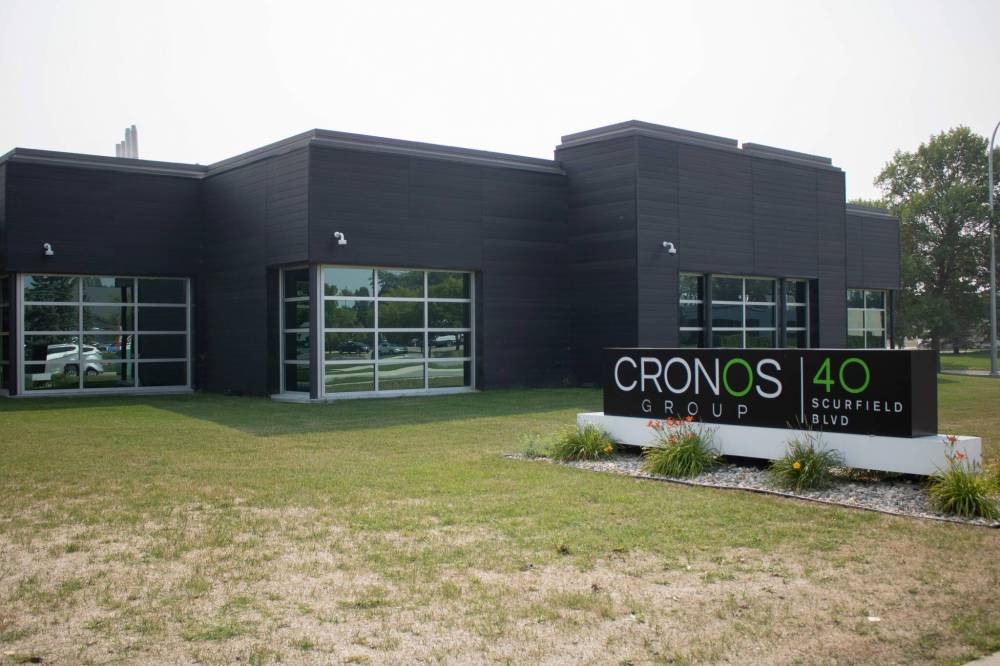Cannabis company closing local facility
Cronos produces rare cultured cannabinoids at Winnipeg plant
Advertisement
Read this article for free:
or
Already have an account? Log in here »
To continue reading, please subscribe:
Monthly Digital Subscription
$0 for the first 4 weeks*
- Enjoy unlimited reading on winnipegfreepress.com
- Read the E-Edition, our digital replica newspaper
- Access News Break, our award-winning app
- Play interactive puzzles
*No charge for 4 weeks then price increases to the regular rate of $19.00 plus GST every four weeks. Offer available to new and qualified returning subscribers only. Cancel any time.
Monthly Digital Subscription
$4.75/week*
- Enjoy unlimited reading on winnipegfreepress.com
- Read the E-Edition, our digital replica newspaper
- Access News Break, our award-winning app
- Play interactive puzzles
*Billed as $19 plus GST every four weeks. Cancel any time.
To continue reading, please subscribe:
Add Free Press access to your Brandon Sun subscription for only an additional
$1 for the first 4 weeks*
*Your next subscription payment will increase by $1.00 and you will be charged $16.99 plus GST for four weeks. After four weeks, your payment will increase to $23.99 plus GST every four weeks.
Read unlimited articles for free today:
or
Already have an account? Log in here »
Hey there, time traveller!
This article was published 15/08/2023 (815 days ago), so information in it may no longer be current.
A cannabis company doing cutting-edge fermentation work in Winnipeg has decided to close its operation by the end of the year, likely throwing dozens of people out of work.
Cronos Group Inc. bought the former Apotex Fermentation plant in 2019 for an undisclosed sum, partnering with Boston-based Ginkgo Bioworks Inc. to produce cultured cannabinoids.
The 84,000-square-foot facility was purpose built for Apotex in 1990 at a cost of about $50 million at the time. Its presence in this market helped form the foundation for a burgeoning biotech industry in the city.

MIKE THIESSEN / WINNIPEG FREE PRESS
Cronos was developing cultured cannabinoids at the Winnipeg facility using biosynthesis and other scientific processes, bypassing the need to cultivate plants and then extract the elements from the plant.
Cronos was producing rare cultured cannabinoids at the Winnipeg facility using biosynthesis along with a variety of scientific processes, bypassing the need to cultivate plants and then extract the elements from the plant.
In its recent second quarter results, Toronto-based Cronos said its exit from the Cronos Fermentation facility and the additional operating expense reductions will mean about $10 million to $15 million in annual savings starting next year.
The company said it intends to continue operating the plant until the end of the year.
While company officials would not confirm the number of employees at the plant, industry sources said there may be as many as 60 people working there.
Emily Whalen, senior manager of corporate communications at Cronos Group, said, “We are doing our best to ensure affected employees are well supported during this transitional period.”
Cronos has already leveraged the results of the technology at the Winnipeg plant, releasing a product called Spinach FEELZ Day Trip Mango Lime gummies in Ontario and B.C.
Whalen said the Winnipeg plant was producing elements that are harder to extract or that exist in small quantities in the cannabis plant.
“When originally purchased, Cronos set out to achieve something no one had done before and most thought impossible,” she said.
“Not only did we prove it was possible to ferment cannabinoids, but Cronos successfully brought them to market in finished products.”
In an analyst conference call last week, Cronos executive chairman Mike Gorenstein said, “We were the first and still the only company to ferment cannabinoids and commercialize them in Canada.”
These “rare cannabinoids” occur in such small volumes in the plants, it makes traditional extraction cumbersome, but some in the cannabis industry say that the elements used in cannabis derivative products like oils and gummies are readily available and sold at low profit margins.
Despite its exit from this type of specialized production, Whalen said Cronos will continue to supply the market.
“We will also pursue alternative forms of production and potentially leverage third-party manufacturers to ensure no disruption to our product offerings,” she said.
But Cronos’s departure from its Winnipeg production facility creates an opportunity to redeploy a facility with specialized capacity.
Kim Kline, president of BioScience Association of Manitoba (BAM), said that fermentation capacity is much sought after by both biotech and food-processing companies.
“We have a few companies in Manitoba that are going out of province to get fermentation work done,” she said. “And there has been millions of dollars invested in fermentation capacity in Winnipeg.”
After Emergent BioSolutions acquired Cangene in 2014, it sold off another pharmaceutical-grade fermentation facility in the city that is no longer in use.
Kline said she has had discussions with industry and government officials to figure out how people could used those fermentors.
martin.cash@freepress.mb.ca



